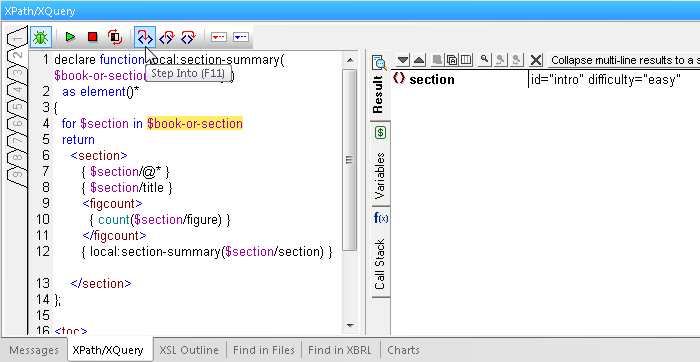
The Altova MissionKit 2016 R2 developer tools and software introduces some new features for developers who are data-oriented and working with XML data.
On the XML side, Altova has incorporated an XQuery debugger. According to product manager David McGahey, it has been difficult to write complex XQuery queries and debug them. It has also been challenging to optimize these queries if they have to be run repeatedly against large XML databases, he said.
The XQuery Debugger can pause executions and trace results, which would apply for developers who store XML in databases. McGahey said that both IBM DB2 and Oracle software, among others, allow storage of an entire XML document in the field of a database. A developer could then use XQuery to query individual parts of that document along with the debugger.
There are also new tools for JSON with this release. In the past, Altova has supported JSON, but there are new features this time to help speed up JSON development.
“There’s been a trend recently that XML is falling out of favor of some applications in favor of JSON, which is a smaller, more compact way of transmitting information between servers and enterprises and databases,” said McGahey.
(Related: Microsoft open-sources .NET CoreCLR)
He said Altova has enhanced support for JSON, which is helpful for those transitioning from XML to JSON. He added that developers might have a lot of legacy data in XML that they would like to migrate to a JSON format, so Altova has added more JSON support to its XMLSpy editor.
One other feature that McGahey highlighted is the .NET API for building custom XBRL solutions, including Excel plug-ins. In addition to Java, COM, and Python APIs, RaptorXML Server now includes a .NET API, which allows developers to integrate RaptorXML Server functionality for high-performance XML, JSON, or XBRL validation and processing in applications written for the Microsoft platform in C# and other .NET languages.
Developers can now integrate RaptorXML functionality into any application for the Microsoft platform. The .NET API makes it possible to build Excel plug-ins to generate XBRL directly from data in Excel, which is an alternative to existing tagging-based solutions.






